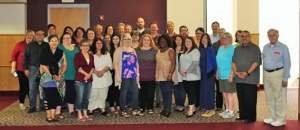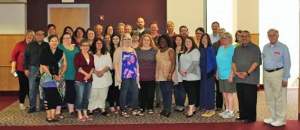
By: Mary Bohlen
On May 22-24, 2018 the Office of Assessment held the Human Cultures/Information Literacy Assessment Workshop. Over 35 faculty, staff, and students gathered in the Union Club at Plaster Student Union to assess student learning in the areas of Human Cultures and Information Literacy. Reviewers, who received a stipend of $500 to participate in the workshop, assessed student work of many types, including essays, Power Point presentations, and poetry. These artifacts were submitted throughout the year by faculty who teach in the Human Cultures/Information Literacy sections of general education and general education coordinators. Reviewers assessed assignments that aligned with the following general goals:
General Goal 6—Information Literacy: Students will be able to identify and evaluate appropriate information and effectively and responsibly use that information for a particular problem as necessary.
General Goal 7—Collaboration: Students will be able to summarize the collaborative process and how working collaboratively with others affects problem-solving and informed decision making.
General Goal 8—Social and Behavioral Sciences: Students will be able to identify and distinguish various institutions (e.g. cultural, political, economic, religious, and educational) and their historical backgrounds, as well as principles of human behavior and social interaction.
General Goal 9—Humanities and the Arts: Students will develop intellectual, imaginative, and/or creative thinking, as they explain how relevant contents (e.g., social, cultural, linguistic, artistic, religious, philosophical, and/or historical) have shaped the thoughts and actions of people worldwide.
Day 1
On the first day of the workshop, reviewers were presented with a Sharepoint site that, for the first time, allowed for all student work to be reviewed and assessed digitally. Many trees were saved by this new process! The HLC recommendations were reviewed and assessment began for Information Literacy. The Office of Assessment received a great deal of meaningful feedback from reviewers on Day One, including the following:
“Students need to know what information literacy is and how it benefits the written work that they are trying to produce. Resource validity and accuracy are not well understood by the student without teaching them about this aspect or making it part of the assignment.”
“I would like to remember this process of evaluation to discuss with my department as we look at re-writing some of our course descriptions and unifying curriculum across sections of particular foundational courses. I think this would be a valuable process to engage in at a departmental course level.”
“I am creating some new learning objectives for my courses outside of General Education right now and looking at the GGs and SLOs and the rubric put together are
really helping me start to formulate ideas for how I will look at my course objectives in the future.”
“It is comforting to see that other instructors clearly have the same challenges I do when it comes to teaching students to effectively choose, integrate, summarize, and synthesize source materials.”
“The workshop protocol was clear and informative. The tools were excellent, and the support from the team was superb. The food and regular breaks helped, too.”
Day 2
On the second day of the workshop, reviewers assessed student learning in the areas of Collaboration and Humanities and the Arts. While it was a challenge to review two areas in one day, treats from Pineapple Whip, on campus for the day, helped reviewers power through the afternoon session. Feedback from Day Two included:
“Collaboration is hard to measure. People submitting artifacts in that category would do well to assign reflective pieces, introductions or prospectuses or something, so that reviewers could more clearly see the mental/metacognitive work of collaboration. This is especially true for creative work, where collaboration is probably happening but is hard to see in the finished product.”
“I think this underscores the value of having students reflect on their group work. It helps keep everyone accountable in group projects, but also gives us a way to look back at how they think
“I am excited to reconfigure some of my own course assignments. Carefully assessing student work according to the GGs and SLOs alerted me to things that my students are learning that I perhaps do not always recognize, and to areas in which they could improve.”
“Continue to revise/modify/improve the goals and SLO’s. It may be useful to have some of the samples of student work to see the practical issues with applying these rubrics. Provide training to faculty on how to capture more example for collaboration (such as asking a reflective question after a collaboration).”
Day 3
On the third day of the workshop, reviewers assessed student learning in the area of Social and Behavioral Sciences. In addition to reviewing artifacts in this area, participants in the workshop were able to review the General Education Survey and discuss how best to use the data gained from the workshop going forward. Feedback from Day Three continued to reflect the care and consideration reviewers were giving to the process:
“I would ask my colleagues to meaningfully reflect on their assignments and how the align with the SLOs in a more specific way. It might be necessary to share the rubric with the instructors so that they can see how the student work is being assessed.”
“Students are interested in projects and assignments that aid in their learning and appreciate the process. They also often prefer these assignments to tests, and I think the concepts and ideas they uncover during a project or paper are likely to stay with them for much longer than what they memorize for a test. How can we gear our general education courses toward being more holistic?”
“Encourage departments to hold a mini-workshop like this where they work together to ensure that the individual assignments are meeting the general education goals that each course was assigned.”
“Revise syllabus for Gen Ed course/s and spend a class session early in semester finding fun ways to brainstorm how Gen Ed goals and SLOs relate to course content and broader student experiences. Conduct a reflection exercise half way through the semester for students to discuss these connections themselves.”
“I recommend that the rubrics of the GenED assessment should be made known to all faculty/instructors and also the personnel in CGEIP collect the various rubrics that instructor create for their assignments. This way CGEIP can understand how to improve GOALS of instruction in the various disciplines.”
“Keep the convo going– I think this workshop has shown that we’re on the way to some really positive changes.”
This workshop provided an opportunity for faculty, staff, and students to come together for three days and provide meaningful assessment of student learning through a variety of types of artifacts, covering four general education goals. Looking ahead, the Office of Assessment will produce a report which will provide recommendations to CGEIP, Assessment Council, Faculty Senate, Deans, and the Provost.
Over the course of the 2018-2019 year, the Office of Assessment will be collecting student work for the Natural World Assessment Workshop 2019.

